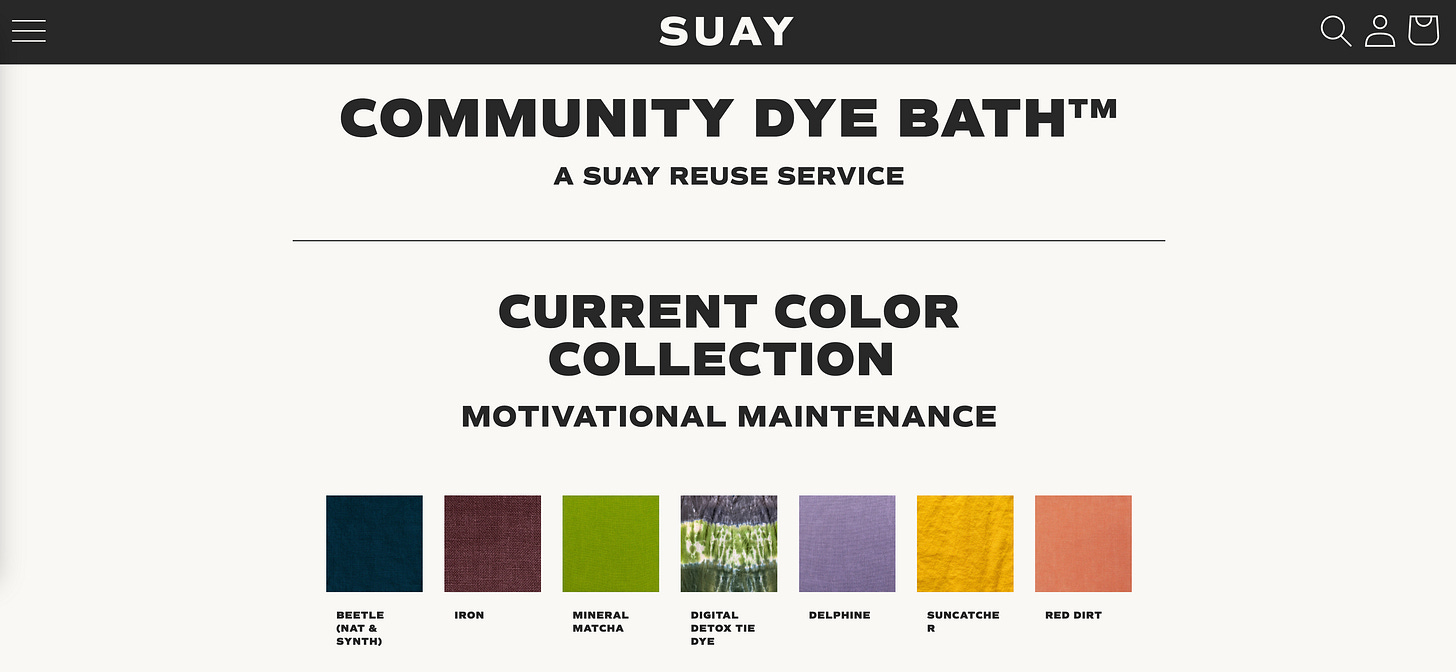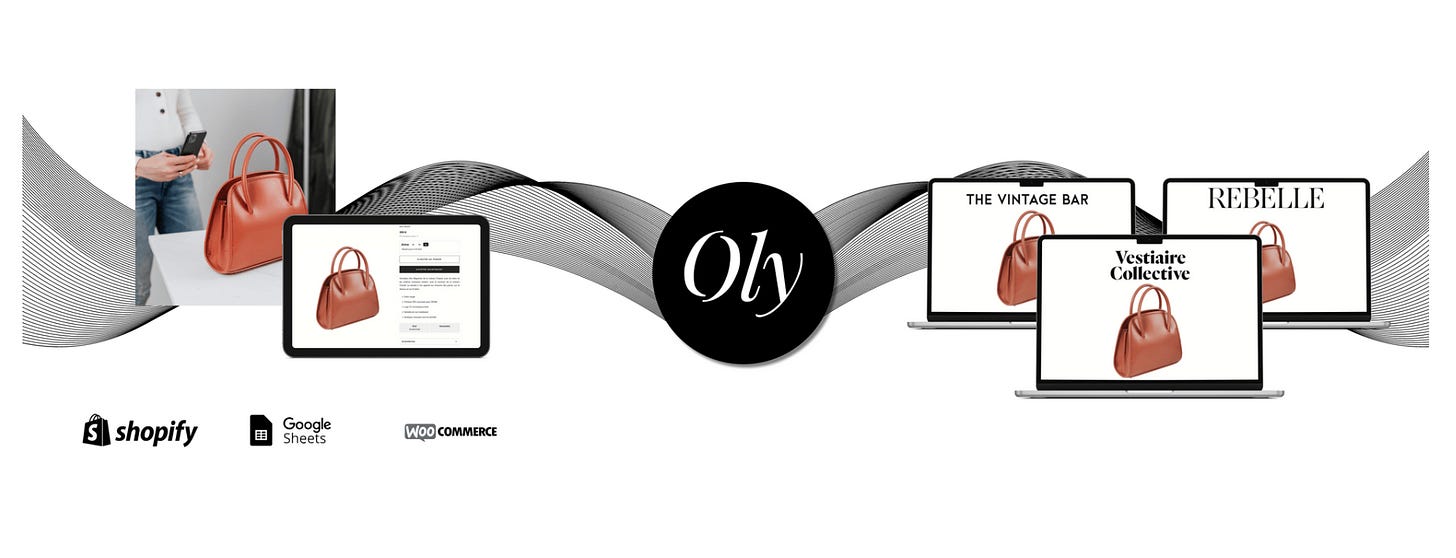Circular Fashion News / May 21: Circ & Reju's industrial-scale factories, Vinted is the biggest fashion seller in France, Upcycled brand MOOT raises funding
Your weekly edit of what has happened in the circular fashion space. The focus is on repair and upcycling initiatives, and textile-to-textile recycling building industrial-scale factories.
Welcome to reading a weekly recap of circular fashion news! Some of last week’s highlights in the circular fashion industry included:
A new report was released on the state of circular fashion in the UK by The Circular Fashion Innovation Network (CFIN)
Secondhand fashion tool, Beni, relaunched with a new value prop
Upcycled fashion company, MOOT, raised a seed financing round
Circ announced to be opening a textile-to-textile recycling plant in France…
Recover partnered with Intradeco to boost recycled cotton fiber production in Central America
Industry News
New report: The state of circular fashion in the UK
The Circular Fashion Innovation Network (CFIN) released its May 2025 report, presenting a comprehensive overview of the UK’s progress toward circular fashion. The report outlines the current landscape, pilot projects, challenges, and policy recommendations in the circular fashion space.
Here are a few insights that stood out to me:
The Circularity Gap: Circularity is highlighted in brand strategies, but the execution is lacking. Whereas 81% of fashion organisations include circularity in their 5-year plans, 63% of customer-facing circular initiatives remain in pilot phases. And none of the surveyed companies feel confident in scaling these circularity pilots. The main roadblocks identified include small financial margins, logistical complexity, and heavy reliance on third-party providers.
Resale and repair still struggle to move from experiment to viable business models: Resale has high interest among fashion brands, but 78% of initiatives are still in pilot phase, often outsourced to third parties. And while repair has high customer participation rate among circular initiatives, repair services remain constrained by skill shortages, operational complexity, and limited revenue potential. Also, while repair aligns naturally with the premium sector, for mass-market brands, repair is still not financially viable.
Brands are afraid of communication around circularity: 40% of brands say they struggle to communicate circularity effectively. Customer confusion, vague terminology, and fear of greenwashing accusations are holding companies back, leading to many brands falling into “greenhushing”, avoiding sustainability messaging altogether. But this creates a vicious cycle: no comms → no awareness → low engagement → low impact.
Recycling infrastructure is still lacking: The UK generates 1.45 million tonnes of post-consumer textiles annually, but lacks the domestic infrastructure to deal with it. CFIN’s proposed “National Textile Recycling Infrastructure Plan” outlines the roadmap: building infrastructure for automated sorting, pre-processing and fibre-to-fibre recycling, investing in technology, developing workforce skills, and creating demand in the market. But for now, this remains largely a blueprint.
→ Read more
→ Read the full report
Fashion resale
Secondhand fashion tool, Beni, relaunched with a new value prop
After four years in the secondhand fashion space, Beni has relaunched with a sharpened value proposition. Previously known for its browser tool that searched for secondhand alternatives while you shopped online, Beni is now tackling a deeper issue of overconsumption.
This new angle stems from the widespread criticism of secondhand fashion that the industry has been waking up to in recent years: if we simply replace our constant consumption with secondhand, we’re not addressing the core issue at hand.
At the core of this rebrand, Beni incentivises customers to stay away from impulse purchases. In a nutshell, you can now save items and looks to your own collections, and Beni will keep searching for better deals for these items in the secondhand market for you. When you decide to purchase, you can come back to see better deals, or maybe to realize you didn’t need this item in the first place.
→ See the new Beni
→ Read more from an interview by Emily Stochl
Vinted has become the biggest fashion seller in France
According to a consumer survey by The French Fashion Institute (IFM), during the first quarter of 2025, Vinted was the biggest fashion seller in France in terms of sales volume.
According to the report, secondhand sales accounted for nearly 11% of all sales volumes. And among young consumers (18-34 years), they accounted for over 16% of all sales volumes.

The RealReal Circularity Report 2025
The RealReal highlighted details about their users and products sold on their platform in their Circularity Report 2025. Here are some interesting data points:
Synthetics have become an industry standard also for luxury – The report by The RealReal confirms that the use of synthetics is not only the practice of fast fashion, but today it is becoming more and more common among higher-end and luxury brands as well. In 2024, 56% of items sold on The RealReal contained synthetic or semi-synthetic materials, such as polyester, nylon, and spandex.
The RealReal shoppers are after “dead” brands – According to the report, 31% of The RealReal shoppers say that, since 2020, they now focus on “buying fewer, more special luxury pieces.” They are looking in secondary market especially unique brands that no one else will have: brands that are no longer operating, such as Claude Montana or Sies Marjan, also known as “dead brands”.
The pool of secondhand shoppers is growing – In 2024, 433,370 people bought something on The RealReal for the first time.
Nobody’s Child partners with Reskinned to resell products on eBay
Nobody’s Child has developed a resale program with Reskinned to resell their products collected from customers in a dedicated eBay storefront.
What is Reskinned?
Reskinned is a circular solution provider for fashion brands, extending the life of garments through resale, repair, repurposing, and recycling. In resale, they offer take-back programs for fashion brands and the ability to resell secondhand items through the Reskinned store or partner platforms like eBay. Beyond resale, they also provide solutions for repairing, repurposing (such as upcycling collaborations), and recycling secondhand clothing.
Fashion repair & upcycling
Upcycled fashion company, MOOT, raised a seed financing round
MOOT specializes in upcycled fashion, crafting unique pieces from materials such as secondhand blankets, bed sheets, leather jackets, and safety belts. In addition to their own fashion collections, they offer an Upcycling-as-a-Service model to help companies reuse their unused materials. Some of MOOT’s customers include for example DHL, Lidl, and German Railways.
With recent additional funding, MOOT plans to optimize its upcycling processes further and expand its partnerships with other companies.
→ Read more here
→ Explore MOOT
United Repair Center announced a partnership with Levi’s
The Amsterdam-based United Repair Centre has partnered with Levi’s to provide repairs for their products. The products needing a repair are collected from customers by Levi’s and shipped to United Repair Centre for repairing. The tailors repairing the products are trained by Levi’s tailors and they use an official repair handbook for the process. At the operational level, the repair work is led by United Repair Centre’s tailoring team, including lead tailor Ramzi, who brings extensive experience from the denim production sector in Syria.
Coachtopia expands to upcycled clothing with Bank & Vogue
Coachtopia is one of the most significant upcycled fashion collections from a major fashion brand. Earlier this year, they launched an accessories collection with Bank & Vogue (the parent company of the vintage retailer Beyond Retro), and now they are dropping another collection, this time featuring clothing. The collection features shirt and trouser sets made from discarded textiles in patchwork style.
Textile recycling
Circ and Reju to open textile-to-textile recycling plants in France and the Netherlands
This week, two leading textile-to-textile recycling solution developers, Circ and Reju, announced plans to open their first industrial-scale recycling plants.
Industrial-scale plants expected by 2028: US-based Circ (backed by companies such as Inditex) will open a plant in France by 2028. Reju, a textile-to-textile recycler owned by French engineering firm Technip Energies, will open its first plant in the Netherlands in the same year.
Focus is on polyester recycling: Circ’s facility will recover both cotton and polyester fibers, while Reju will focus exclusively on recovering polyester.
Recycling volumes are in the tens of thousands of tonnes: Circ aims to process 70,000 metric tons of material annually. Reju targets a capacity of 50,000 tonnes of rBHET per year, which will be further processed into Reju PET. While these volumes are substantial, they still represent a small share of the textile industry’s total material use. As Business of Fashion noted, both companies must still secure hundreds of millions in funding and overcome challenges in scaling production to reach these targets.
→ Read more about Circ’s factory
→ Read more about Reju’s factory
→ Read Business of Fashion analysis
Recover partners with Intradeco to boost recycled cotton fiber production in Central America
Recover, a Spanish company specializing in recycled cotton fibers, has teamed up with Intradeco, a textile manufacturer, to build a new processing plant in El Salvador. Located near textile waste and production streams, the plant will aim to enable efficient recycling processes and help reduce carbon emissions from logistics. By leveraging Recover’s technology, the facility aims to meet the growing demand for circular textile solutions and nearshoring in the Americas.
The joint venture is set to start operations in 2025, and once operational, the facility aims to scale the production of recycled cotton fiber across North and South America.
Bookmarked
Article: How vintage denim became the new luxury by Glossy – Glossy featured the growing obsession with vintage denim, and what the landscape looks like in the US. The article featured for example “With Love Lenny”, a vintage denim store that focuses on customizing vintage jeans for customers, either in-person or even through virtual fitting sessions. This value-added service brings a unique touch to vintage shopping.
A way to scale fashion upcycling: Suay Community dye bath – Suay is an US-based upcycled fashion brand, and “community dye baths” are a specific part of their product offering. Last week I was discussing ways of scaling fashion upcycling, and benchmarked Suay’s way of “bulk dye” clothing as one way to scale upcycling. In Suay’s “Community dye bath”, customers can send in their clothes to be dyed in large 100 lb containers together with other customers’ products.
Fashion resale startup: Oly – Fashion resale startup Oly allows secondhand fashion resellers to list their product catalog across all marketplaces automatically. Currently, the platform allows for customers to list their products on platforms like eBay, Vestiaire Collective, The Vintage Bar, and Grailed.
Upcycled fashion brand: Rave Review – This Stockholm-based fashion brand debuted in 2018 with a fashion collection made from vintage bed linens. The brand has continued transforming used home textiles into high fashion. In addition to vintage materials, they also utilize deadstock materials widely in their collections.
Substack: Fashion Tech Market Memo: Rental - Part 2 by The Pattern Maker – If you’re interested in fashion rental, especially from the business perspective, this Substack series by Rachel Sterling from The Pattern Maker is a must-read. I’ve previously highlighted the Part 1 of the series, which gave an overview to the fashion rental market. This Part 2 focuses on the industry from investor perspective (although, super useful also for startup founders!) and looks at for example the market size, business economics, and investment landscape.
Podcast: Circular Materials: Feedstock creation by The Untangling Circularity Podcast – This podcast episode dives deep into mechanical textile-to-textile recycling, with a particular focus on feedstock handling. The conversation features Constanza Gomez from Sortile, a textile sorting technology provider, and Jose Salguero from Intradeco, an apparel manufacturer. Together, they share insights from their collaboration in advancing textile-to-textile recycling.
That is all for now, let’s hear again next week! In the meantime, let’s continue the discussion in the comments, LinkedIn, or Instagram <3
xx Tiina

























Coachtopia has been doing apparel since it launched!! :D but otherwise exciting from Coach, you can now list items on Poshmark directly from your Coach insider account, no need to take pictures and fillout those details anymore 😮💨
Thanks for the shout out Tiina! Also loving all the upcycling companies. Added Rave Review and MOOT to my list of companies to dig in on in addition to Suay which you've already put me on to. Very cool stuff!